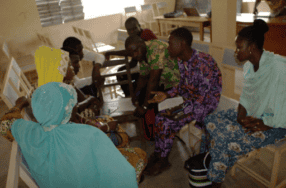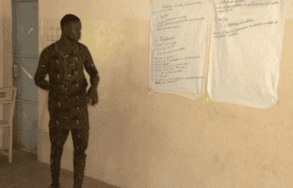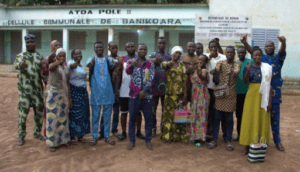Engaging in the Green Economy Through Youth-Led Participatory Research
August 28th, 2024 | News
In Northern Benin, young people play a vital role in shaping a sustainable future. As climate change, environmental degradation, and unemployment increasingly threaten livelihoods and security in the region, understanding how young people envision Northern Benin’s future through a green workforce is critical. World Education partnered with Beninese NGO Sia N’Son to implement a participatory, youth-led research activity that explores the potential of a green workforce to address environmental degradation, combat climate change, brighten economic prospects for youth, and improve regional security.
In many parts of the world, including the community of Banikora in Northern Benin, young people bear the brunt of social and environmental challenges. High levels of youth unemployment coupled with climate change’s adverse effects on agriculture and natural resources create a volatile environment where radicalization can take root. Engaging young people in participatory research allows them to become agents of change and cultivate the skills and knowledge they need to contribute to the green economy and strengthen community resilience.
Youth-led participatory research is not just about gathering data; it is about fostering ownership, strengthening capacity, and ensuring that youth perspectives are at the forefront of change.
The youth-led participatory research activity in Northern Benin focused on two main objectives:
 The World Education and Sia N’Son teams initiated the research process through an action research course. Using project-based learning pedagogies and PYD-rooted exercises, the course engaged 16 youth from the Association des Jeunes pour le Développement Émergent de Banikoara (Association of Young People Committed to the Emerging Development of Banikoara [AJEDEB]), a nonprofit organization created by young people in Northern Benin.
The World Education and Sia N’Son teams initiated the research process through an action research course. Using project-based learning pedagogies and PYD-rooted exercises, the course engaged 16 youth from the Association des Jeunes pour le Développement Émergent de Banikoara (Association of Young People Committed to the Emerging Development of Banikoara [AJEDEB]), a nonprofit organization created by young people in Northern Benin.
Course participants learned research fundamentals and principles, reflected on green life skills in their context, and started designing their research projects. As part of learning research methodologies and how to apply them, participants developed research questions that resonated with them and their communities and created data collection tools. A Sia N’Son research expert and a youth facilitator provided guidance as the youth embarked on their research.
 The participatory research process involved workshops, focus group discussions, and interviews with a diverse group of young people, elders, community leaders, and private sector actors in Banikoara. The young researchers randomly sampled approximately 10 percent of individuals 19–45 years old from both urban and rural areas of the community. They then analyzed the data and presented it to key stakeholders including AJEDEB, community members, and agriculture sector representatives for feedback.
The participatory research process involved workshops, focus group discussions, and interviews with a diverse group of young people, elders, community leaders, and private sector actors in Banikoara. The young researchers randomly sampled approximately 10 percent of individuals 19–45 years old from both urban and rural areas of the community. They then analyzed the data and presented it to key stakeholders including AJEDEB, community members, and agriculture sector representatives for feedback.
The young researchers discovered two critical insights through their research:
 The youth-led participatory research activity in Northern Benin offers valuable insights into how an improved, green workforce can combat environmental degradation and climate change. A green workforce ultimately offers meaningful alternatives to radicalization, helping improve regional security.
The youth-led participatory research activity in Northern Benin offers valuable insights into how an improved, green workforce can combat environmental degradation and climate change. A green workforce ultimately offers meaningful alternatives to radicalization, helping improve regional security.
For Northern Benin and other regions facing similar challenges, involving youth in the green economy is crucial. By creating a space for the growth of young people through action-based, PYD-rooted education and training, we can build a future where both the environment and the community thrive.
World Education fosters enduring partnerships across regions and sectors to advance education outcomes for all. We offer education systems strengthening, program design and implementation, applied research and evaluation, capacity development, and policy development services.